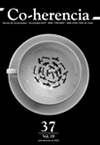Alejandra Pizarnik and the non-place of poetic bodies, delirium and creative drive
Main Article Content
Keywords
Poetic body, psyche, life drive, being, surrealism
Abstract
The intimacy of Alejandra Pizarnik, weaver of words of torment and madness, gives a glimpse of the irrational and musical hells that traverse a particular expression of poetic psyche: the word that dares to speak a night that presages elegy. The wounded word and the fatally broken life of this author place the reader in a permanent dialogue between vitalism and existentialism. The purpose of this article is to reflect on the limits of the human will and the relationship between life and literary work, based on a dissertation on the texts of Pizarnik, who, rather than striving to embellish resignation, prefers to inquire about the destiny and meaning of the poetic word, caged and incapable of expressing the wounds of being. She searches, from precise rhetorical figures of unquestionable sensorial impact, for the place of poetic bodies in the intricacies of a maladjusted existence without compass. An existence that is a mirror (or perhaps an abyss) of the reality unveiled by a philosophical poetry in search of impossible meaning and desire, but whose search remains a necessary topic of literature.
Downloads
References
Agamben, G. (2006). Estancias: La palabra y el fantasma en la cultura occidental (T. Segovia, Trad.). Pre-Textos.
Biblioteca Nacional Mariano Moreno [bnmm]. (2022, septiembre 22). Alejandra Pizarnik. ‘Archivo de video’. Youtube. https://www.youtube.com/watch?v=ZzPbRYyh1sk
Bordelois, I. y Piña, C. (Eds.) (2017). Pizarnik: Nueva correspondencia (1955-1972). Lumen.
Deleuze, G. y Guattari, F. (1994). Mil Mesetas: Capitalismo y esquizofrenia (2a ed., J. Vásquez Pérez, Trad.). Pre-Textos.
Genette, G. (1970). Lenguaje poético, poética del lenguaje. En J. Sazbón (Comp.), Estructuralismo y literatura (pp. 53-89, J. Giacobbe, Trad.). Nueva Visión.
Lasarte, F. (1983). Más allá del surrealismo: la poesía de Alejandra Pizarnik. Revista Iberoamericana, 49(125), 867-877. https://doi.org/10.5195/reviberoamer.1983.3844
Marchamalo, J. (2011). Cortázar y los libros: Un paseo por la biblioteca del autor de Rayuela. Fórcola.
Martínez Comorera, A. (2021). La poesía como enfermedad en El infierno musical de Alejandra Pizarnik. Revista Letral, (26), 49-74. https://doi.org/10.30827/rl.v0i26.16489
Mitre, E. (2007). Vicente Huidobro: Hambre de espacio y sed de cielo. Monte Ávila Editores.
Moreno, M. L. (2006). La palabra deformada: conversaciones con el poema “En esta noche, en este mundo” de Alejandra Pizarnik. Revista Internacional de Culturas y Literaturas, (5), 19-32. https://doi.org/10.12795/RICL.2006.i05.02
Novalis (1975 [1800]). Himnos a la noche; Enrique de Ofterdingen (ed. de E. Barjau). Editora Nacional.
Pizarnik, A. (2002). Prosa completa. Lumen.
Pizarnik, A. (2003). Diarios. Lumen.
Pizarnik, A. (2007). La extracción de la piedra de locura. Otros poemas. Visor Libros.
Pizarnik, A. (2009). Alejandra Pizarnik (1936-1972) (Prol. de R. Toledano). El País.
Ramírez, J. A. (2017). El expresionismo poético de Alejandra Pizarnik. Colección de Estudios Literarios de la Universidad de Guanajuato.
SiVainVi InK Editorial (2020, agosto 12). Alejandra Pizarnik: Memoria iluminada, biografía Canal Encuentro completa. [Archivo de video]. Youtube. https://www.youtube.com/watch?v=DR-_VvvKz7U&t=668s
Valéry, P. (2009 [1957]). Teoría poética y estética (C. Santos, Trad.). La balsa de la Medusa.





